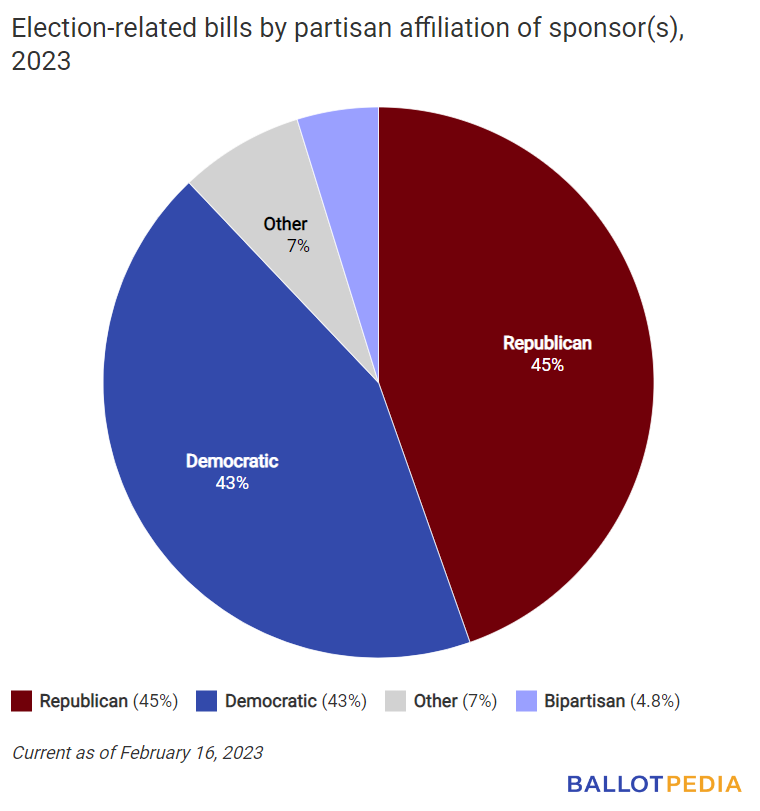In today's issue, you'll find:
- Legislative activity: About the bills acted on this week.
- The big picture:
- Legislative status: The number of bills introduced, voted on, or enacted into law.
- Concentration of activity: The states that have seen the most legislative activity.
- Partisan affiliation of sponsorship: The number of bills that Democrats and Republicans have sponsored.
Legislative activity
Since Feb. 10, state legislatures have acted on 289 bills, a 17.6% decrease from last week's 351 bills. These 289 bills represent 19.7% of the 1,466 pieces of legislation we are currently tracking. Ninety-seven of these bills are from states with Democratic trifectas, 133 are from states with Republican trifectas, and 59 are from states with divided governments.
221 bills were introduced (or had pre-committee action).
- Democratic trifectas: 91
- Republican trifectas: 87
- Divided governments: 43
28 bills advanced from committee.
- Democratic trifectas: 3
- Republican trifectas: 14
- Divided governments: 11
34 bills passed one chamber (or had pre-adoption action in the second chamber).
- Democratic trifectas: 3
- Republican trifectas: 27
- Divided governments: 4
Six bills passed both chambers. Those bills, with their official bill titles, are:
- Republican trifectas: 5
- SD HB1057: Allow for the appointment of county coroner by all counties.
- SD HB1062: Clarify the convening of recount boards for primary elections.
- WY HB0005: Voter registry list-voter ID and absentee ballots.
- WY HB0047: Election equipment-federal certification.
- WY HB0079: Voter I.D.-concealed carry permit.
- Divided governments: 1
- VA SB1151: Local government; standardization of public notice requirements for certain intended actions.
The big picture
To date, we have tracked 1,466 election-related bills. These bills were either introduced this year or crossed over from last year's legislative sessions.
Legislative status
The pie charts below show the legislative status of the bills we are tracking. The following status indicators are used:
- Introduced: The bill has been pre-filed, introduced, or referred to committee but has not otherwise been acted on.
- Advanced from committee: The bill has received a favorable vote in committee. It has either advanced to another committee or to the floor for a vote.
- Passed one chamber: One chamber has approved the bill.
- Conference committee: Chambers have passed differing versions of the bill, and a conference committee has been appointed to reconcile the differences.
- Passed both chambers: The bill has cleared both chambers of the legislature.
- Enacted: The bill has been enacted into law, by gubernatorial action or inaction or veto override.
- Vetoed: The bill has been vetoed.
- Dead: The bill has been defeated in committee or on the floor.
The pie charts below show the legislative status of bills in Democratic and Republican trifectas, respectively.
Concentration of activity
The map below shows the concentration of legislative activity across the nation. A darker shade of orange indicates a higher number of relevant bills that have been introduced. A lighter shade of orange indicates a lower number of relevant bills.
Partisan affiliation of sponsor(s)
The pie chart below shows the partisan affiliation of bill sponsors.
Bills by topic
The chart below shows the topics of a sample of the 1,466 bills we have tracked this year. The number listed on the blue portion of each bar indicates the number of Democratic-sponsored bills dealing with the subject in question. The number listed on the red portion of the bar indicates the number of Republican-sponsored bills. The purple and gray portions of the bar indicate the number of bipartisan-sponsored bills and bills with unspecified sponsorship, respectively. Note that the sums of the numbers listed do not equal the total number of bills because some bills deal with multiple topics.


